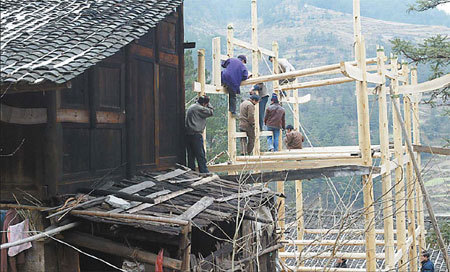Authorities have outlined a timetable and increased rebuilding subsidies to ensure the completion of recovery work in snow-hit regions by June, a top official said yesterday.
The deadline was set to avoid further damage with the coming flood season in the south, Wang Zhenyao, director of the disaster relief bureau of the Ministry of Civil Affairs, said.

Workers build new homes in Nanhua village, Guizhou Province, to replace those destroyed by the recent snowstorms.
The ministry has asked local governments to come up with plans for the required work and act on them within the next three months.
The focus on rebuilding and recovery now involves the housing of poor residents whose homes were damaged or destroyed in the blizzards, Wang said in the online interview at www.gov.cn.
Due to the rising cost of rebuilding houses in the affected regions, the ministries of civil affairs and finance will raise subsidies for the rebuilding of each damaged house - currently set at 1,500 yuan (US$210) - for the rural poor already receiving minimum allowances.
The higher subsidies are part of the increase in relief funds from the government for about 17 million residents affected by the weather.
Heavy snows in southern China since January have killed 129 people and forced the evacuation of 1.7 million.
About 170 hectares of farmland have also been left barren, while 480,000 homes have been destroyed and 1.6 million damaged. The devastation has resulted in losses of 151.6 billion yuan (US$21.2 billion).
The National Development and Reform Commission (NDRC) also pledged yesterday to take a slew of measures to stabilize fertilizer prices and guarantee grain production this year.
According to the commission, fertilizer prices have risen substantially over the past six months, with some increasing by 60 percent. This is largely due to the increase in raw materials such as crude oil and natural petroleum gas, it said.
Officials said the nation's fertilizer market is set to remain stable this year, following a 10 percent increase in output.
"Fertilizer supply is key to restoring agricultural production, especially with the southern provinces hit by heavy snowstorms," the NDRC said.
According to the Ministry of Agriculture, 13.47 million hectares of vegetables and grain were hit by the bad weather.
The central government will implement measures such as tax incentives and export tariff hikes to stabilize fertilizer prices, the NDRC said.
It will also increase the minimum-purchase price for grains this year to reduce the impact of rising fertilizer prices and boost agricultural production.
Similarly, grain traders will receive transportation subsidies to guarantee rice sales, the commission said.
Cold weather continues
Several Chinese cities woke up to a brutally cold morning yesterday as temperatures plummeted amid snow and sleet storms.
The provincial capital of Wuhan in Hubei saw temperatures fall 19 C in just 48 hours.
The icy temperatures claimed lives and disrupted traffic.
The death toll from a coach accident caused by the cold near Wuhan rose to eight as of Monday night. The coach overturned on an icy road near the city, injuring 20 people.
The latest fatality was a man who died on the way to hospital.
In Qingdao, Shandong province, snow forced the closure of several expressways. More than 160 people were sent to de-ice the roads.
In Hainan province, a new cold front led to a temperature plunge after a 26-day rainy spell.
(China Daily February 27, 2008)